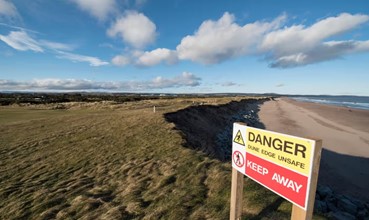
'This is climate change': Scottish Beach Eroding by 7 Meters Annually
The centuries-old Montrose golf links are succumbing to the sea, and the town faces an increased flood risk as coastal erosion intensifies.
A beach in northeastern Scotland is rapidly deteriorating due to climate change, endangering a nearby town with potential flooding and causing its historic golf links to disintegrate into the ocean.
The 2021 Dynamic Coast report analyzed the erosion rate at Montrose, predicting a loss of 120 meters over 40 years, averaging 3 meters annually.
Montrose residents are bracing for the autumn storm season, as last year's unprecedented storms eroded the beach by 7 meters within a year, exceeding scientists' predictions by over 4 meters.
An EnviroCentre report for Montrose Golf Links in December disclosed historically observed retreat rates between 2.8–7.0 meters annually, stating that "current coastal erosion trends are likely to persist or even accelerate due to future climate change."
Scotland experienced unparalleled storms last season, and this spring marked the wettest April since 1947.
In November, Montrose's beach promenade collapsed during high tide after Storm Babet, creating a large hole on the walkway. This storm alone caused 3 meters of beach erosion.
The following month, during Storm Gerrit, nearby Inverbervie climate station recorded gales of 86mph.
David Wood, head of Montrose community council's coastal erosion sub-group, remarked, "I've lived in Montrose all my life, and none of us can recall storms of the magnitude we had [last season]. Were these once-in-100-year storms? Will it be another 100 years? Probably not. This is climate change."
Montrose has a long history of coastal erosion, evident in the loss of its golf links, established over 460 years ago. The original sixth tee vanished in 1994, and the third tee, moved from the edge in 2017, has also disappeared. The sea has advanced 70 meters in the past 30 years.
Research by Angus council and Dynamic Coast indicates that urgent maintenance of the receding dunes at Montrose Bay is crucial to prevent potential flood corridors to the town's residential areas.
"I'd give Montrose another three years at most before it's underwater," Montrose independent councillor Tommy Stewart told the Guardian in December. "If no action is taken, the defenses will breach."
The EnviroCentre report also projected an estimated 170 meters loss due to erosion and flooding south of Montrose by 2100.
The community council aims to initiate emergency work in April 2025, involving substantial sand loading on the beach to restore lost levels.
EnviroCentre estimated the beach maintenance costs at £2 million, while Angus council is £50 million in debt.
Wood acknowledged financial concerns but noted that Angus council had been collaborating closely with the community council to develop an economic proposal for the Scottish government to commence works in April.
"The funding will need to come from the Scottish government in some capacity," he stated. "Even the short-term beach renourishment isn't a one-time fix. You do it once, and it may require annual repetition."
Wood emphasized that next year's proposed work is a short-term measure to slow erosion, allowing time to devise longer-term solutions, though funding sources remain uncertain.
An Angus council spokesperson said: "Angus council has identified a preliminary solution to monitor and manage erosion at Montrose. We are in regular discussions with the Scottish government and NatureScot, leading a Dynamic Coast project to address coastal erosion in Angus. The projected cost of this project is substantial, and we are preparing a funding proposal."
In January, Màiri McAllan, the Scottish government's secretary for transport, net zero, and just transition, announced a £440,000 government grant to Angus council for combating coastal erosion at Montrose.
A government spokesperson commented, "The climate emergency isn't a distant threat—we're already witnessing its impacts on coastal communities like Montrose due to extreme weather and rising sea levels. The Scottish government continues to collaborate with the local community and stakeholders to find common ground and develop a consensus on addressing coastal erosion at Montrose."